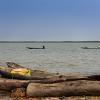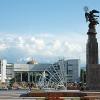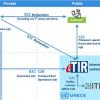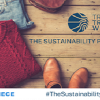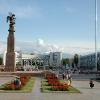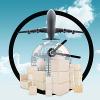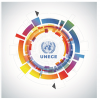Press Releases
Displaying Results 301 - 325 of 1417
The 21st Century is characterized by increasing digitalisation. As more and more everyday services move online, ‘offliners’ risk being excluded in an era that embraces fast-changing innovation in digital technology. This predominantly concerns older persons who are less digitally connected than
On 16 June, Guinea-Bissau became the 4th African country (45th party) to accede to the Convention on the Protection and Use of Transboundary Watercourses and International Lakes (Water Convention), whose secretariat is provided by UNECE. It is also a party to the Convention on the Law of the Non-
Serbia is undergoing extensive reforms to consolidate a competitive market-based economy. The Government considers trade, along with investment, as an essential element to achieving structural transformation and inclusive growth. Reforms accord priority to harmonizing non-tariff measures.
As part
Two new United Nations Vehicle Regulations will reduce the number and severity of collisions between vehicles moving off from a stationary position or in reverse manoeuvre at low speed, and pedestrians and cyclists. They build on the provisions adopted in 2018 introducing Blind Spot Information
Annually, food in total value of over USD 1.8 trillion is traded between nations and global exports of food have increased on average by seven per cent per year in the last 20 years. In this trade, trust and quality controls are essential to protect consumers and maintain the industry. The exchange
Countries across the pan-European region and North America are intensifying efforts to make their resource use more circular: to close the loop between raw materials, products and wastes so that materials remain in use and consumption of finite resources is reduced. But the lack of an
Approximately 150 million people are homeless and more than 1.8 billion people worldwide lack adequate and affordable housing. While levels of homelessness vary considerably across UNECE countries, finding sustainable solutions to ensure access to housing for all members of society remains a
Amidst the COVID-19 pandemic, the importance of efficient trade processes has become clear as a means to allow for fast and safe movement of products, including bringing the life-saving medicines and food products to people, and to reduce the economic impacts of the crisis. In the Kyrgyz Republic,
Despite decades of discussions on the challenges and intersections between gender and transport, progress has been slow in implementing a gender perspective in transport policies. This has been problematic, for example, in urban planning which fails to recognise the different travel patterns
The COVID-19 pandemic spread around the world at lightning speed, devastating cities and communities and prompting a lockdown. The lockdown period also provided some respite for nature, resulting in memorable sights of ‘nature unlocked’ in our urban habitats.
To immortalize such sights and to
Human-caused methane emissions are rising, and must be reduced by 40 to 45 per cent by 2030 to limit global temperature rise to 1.5° C, warned the Global Methane Assessment released last month by the Climate and Clean Air Coalition (CCAC) and the United Nations Environment Programme (UNEP). This
Ghana’s transboundary river basins, namely the Volta River basin (shared with Benin, Burkina Faso, Côte d’Ivoire, Mali and Togo – home to over 23 million people, with a population projected to more than double by 2050), Bia and Tano Rivers (shared with Côte d’Ivoire) and Todzie-Aka basin (shared
The new legal framework for the full digitalisation of the TIR system (the so-called eTIR) enters into force today, opening eTIR to 77 countries across five continents.
This landmark change will allow for completely paperless cross-border transit of goods, under the customs guarantee of the TIR
Asserting and verifying sustainability claims in the garment and footwear sector are set to become easier thanks to a toolkit of policy recommendations, implementation guidelines and standard endorsed by UNECE member States that provide traceability and transparency solutions for tracking any
Today, European countries adopted the Vienna Declaration to spur the transformation towards clean, safe, healthy and inclusive transport and mobility, with a strong focus on promoting cycling across the pan-European region.
The Vienna Declaration was signed at the end of the Fifth High-level
As one of the most sustainable, inclusive, safe, and healthy forms of mobility, cycling received a major boost today with the adoption of the first-ever Pan-European Master Plan for Cycling Promotion at the Fifth High-Level Meeting on Transport, Health and Environment (THE PEP). The Master Plan is
The trade disruptions caused by the COVID-19 pandemic shook the Kyrgyz economy, which fell by 8.6 per cent in 2020 - for the first time in 26 years, according to the National Statistics Committee of the Kyrgyz Republic. As the country continues its efforts to “build back better”, it is imperative
Speed kills. A child hit by a car at 30 km/h (20 mph) can survive. Hit at 80 km/h (50 mph), most will die. “Streets for Life” is the slogan chosen for the 6th United Nations Global Road Safety Week (UNGRSW) to be launched this 17 May 2021, calling for 30 km/h (20 mph) speed limits to be the norm
With a pledge to plant almost 83,000 new trees, Moscow became the first city in Russia to officially commit to the initiative launched by the United Nations Economic Commission for Europe (UNECE) in 2019.
As one of the world’s megacities with a population of over 12 million, Moscow is globally
In the framework of its fifth International PPP Forum (22-26 April 2021), UNECE organised a competition to showcase the best People-first PPP projects contributing to 'Build Back Better' from Covid-19.
Projects needed to address the following issues: stakeholder and community empowerment; poverty
Since 2018, UNECE has been assisting Montenegro in the implementation of the recommendations from the third Environmental Performance Review (EPR) carried out in 2015.
Since the beginning of the COVID-19 pandemic, activities have been adapted, with funds being redeployed to support the
The safety, security, efficiency, and resiliency of supply chains will benefit from air cargo digitalization, supported by standards developed at UNECE’s UN Centre for Trade Facilitation and Electronic Business (UN/CEFACT).
Public health concerns over COVID-19 are a new driving force behind
The United Nations Economic Commission for Europe (UNECE) and the Norman Foster Foundation signed a Memorandum of Understanding (MoU) on 23 March 2021.
The two organisations formalise their cooperation in the promotion of sustainable housing and sustainable cities through the establishment of the
A UNECE-led partnership will improve energy efficiency of the global building supply chain and its products to deliver high performance buildings in seven UNECE member States: Armenia, Georgia, Kyrgyzstan, Republic of Moldova, Tajikistan, Ukraine, and Uzbekistan.
The launch of the project was
The extraction of raw materials worldwide has more than doubled since 1990 and could double again by 2060, fuelling environmental degradation and increased vulnerability to climate change. As major users and producers of natural resources, 56 countries of the UNECE region, spanning from North



